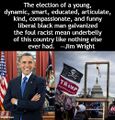Barack Obama (nonfiction)
Barack Hussein Obama II (/bəˈrɑːk huːˈseɪn oʊˈbɑːmə/ (audio speaker iconlisten) bə-RAHK hoo-SAYN oh-BAH-mə;[1][2] born August 4, 1961) is an American politician who served as the 44th president of the United States from 2009 to 2017. A member of the Democratic Party, Obama was the first African-American president of the United States.[3] He previously served as a U.S. senator from Illinois from 2005 to 2008 and as an Illinois state senator from 1997 to 2004.
Obama was born in Honolulu, Hawaii. After graduating from Columbia University in 1983, he worked as a community organizer in Chicago. In 1988, he enrolled in Harvard Law School, where he was the first black president of the Harvard Law Review. After graduating, he became a civil rights attorney and an academic, teaching constitutional law at the University of Chicago Law School from 1992 to 2004. Turning to elective politics, he represented the 13th district in the Illinois Senate from 1997 until 2004, when he ran for the U.S. Senate. Obama received national attention in 2004 with his March Senate primary win, his well-received July Democratic National Convention keynote address, and his landslide November election to the Senate. In 2008, a year after beginning his campaign, and after a close primary campaign against Hillary Clinton, he was nominated by the Democratic Party for president. Obama was elected over Republican nominee John McCain in the general election and was inaugurated alongside his running mate Joe Biden, on January 20, 2009. Nine months later, he was named the 2009 Nobel Peace Prize laureate, a decision that drew a mixture of praise and criticism.
Obama signed many landmark bills into law during his first two years in office. The main reforms include: the Affordable Care Act (ACA or "Obamacare"), although without a public health insurance option; the Dodd–Frank Wall Street Reform and Consumer Protection Act; and the Don't Ask, Don't Tell Repeal Act of 2010. The American Recovery and Reinvestment Act and Tax Relief, Unemployment Insurance Reauthorization, and Job Creation Act served as economic stimuli amidst the Great Recession. After a lengthy debate over the national debt limit, he signed the Budget Control and the American Taxpayer Relief Acts. In foreign policy, he increased U.S. troop levels in Afghanistan, reduced nuclear weapons with the United States–Russia New START treaty, and ended military involvement in the Iraq War. In 2011, Obama ordered the drone-strike killing of Anwar al-Awlaki, a US citizen and suspected al-Qaeda operative, leading to controversy. He ordered military involvement in Libya for the implementation of the UN Security Council Resolution 1973, contributing to the overthrow of Muammar Gaddafi. He also ordered the military operation that resulted in the death of Osama bin Laden.
After winning re-election by defeating Republican opponent Mitt Romney, Obama was sworn in for a second term on January 20, 2013. During this term, he promoted inclusion for LGBT Americans. His administration filed briefs that urged the Supreme Court to strike down same-sex marriage bans as unconstitutional (United States v. Windsor and Obergefell v. Hodges); same-sex marriage was legalized nationwide in 2015 after the Court ruled so in Obergefell. He advocated for gun control in response to the Sandy Hook Elementary School shooting, indicating support for a ban on assault weapons, and issued wide-ranging executive actions concerning global warming and immigration. In foreign policy, he ordered military interventions in Iraq and Syria in response to gains made by ISIL after the 2011 withdrawal from Iraq, promoted discussions that led to the 2015 Paris Agreement on global climate change, oversaw and ultimately apologized for the deadly Kunduz hospital airstrike, continued the process of ending U.S. combat operations in Afghanistan in 2016, initiated sanctions against Russia following the invasion in Ukraine and again after interference in the 2016 U.S. elections, brokered the Joint Comprehensive Plan of Action nuclear deal with Iran, and normalized U.S. relations with Cuba. Obama nominated three justices to the Supreme Court: Sonia Sotomayor and Elena Kagan were confirmed as justices, while Merrick Garland was denied hearings or a vote from the Republican-majority Senate. Obama left office on January 20, 2017, and continues to reside in Washington, D.C.
During Obama's terms as president, the United States' reputation abroad, as well as the American economy, significantly improved. Obama's presidency has generally been regarded favorably, and evaluations of his presidency among historians, political scientists, and the general public frequently place him among the upper tier of American presidents. Since leaving office, Obama has remained active in Democratic politics, including campaigning for candidates in the 2018 midterm elections, appearing at the 2020 Democratic National Convention and campaigning for Biden during the 2020 presidential election. Outside of politics, Obama has published three bestselling books: Dreams from My Father (1995), The Audacity of Hope (2006) and A Promised Land (2020).
In the News
Fiction cross-reference
Nonfiction cross-reference
External links
- Barack Obama @ Wikipedia

